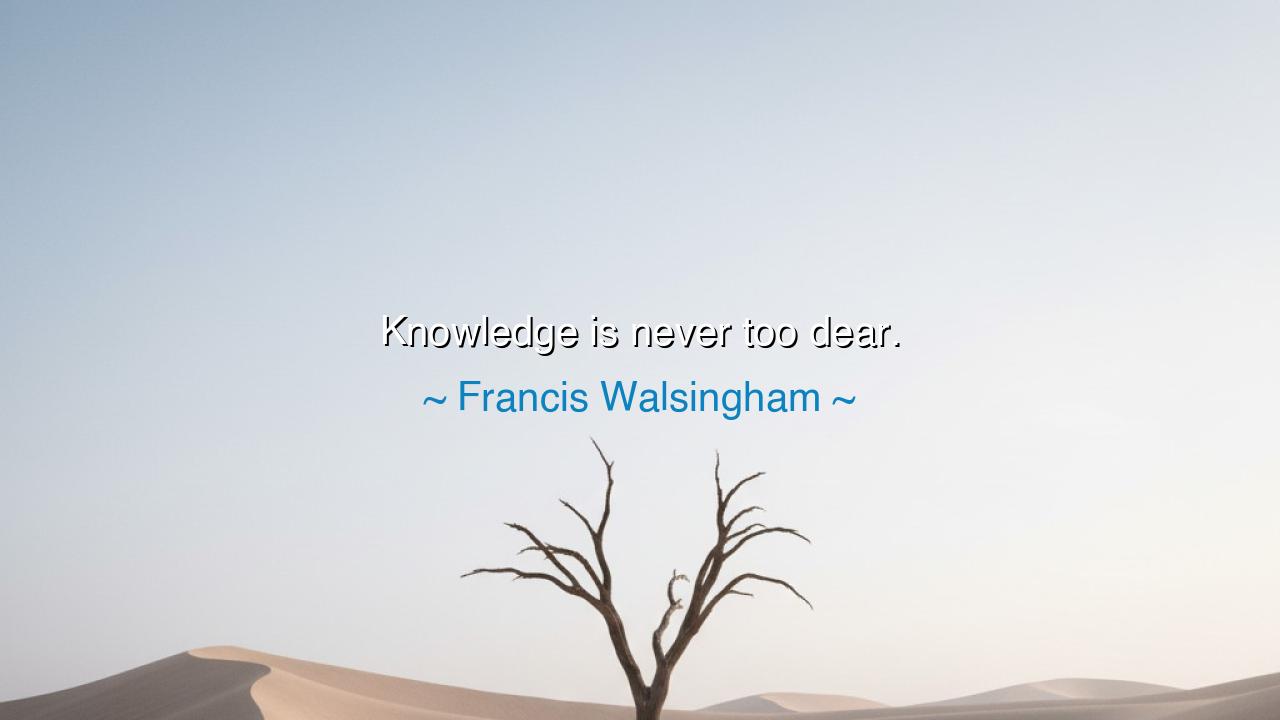
Knowledge is never too dear.






Hear the words of Francis Walsingham, spymaster of England and servant to Queen Elizabeth, who declared: “Knowledge is never too dear.” These words, born in an age of plots and shadows, carry wisdom that resounds beyond his time. For Walsingham lived in an era when kingdoms were threatened not only by armies but by secrets, and he knew that knowledge, however costly to obtain, was more precious than gold, more powerful than weapons, and more enduring than any fortress of stone.
In his saying, Walsingham reminds us that the price of knowledge—whether paid in treasure, in labor, or in risk—is never too high when weighed against the ruin of ignorance. For ignorance blinds the eyes, leaves the soul defenseless, and exposes kingdoms and men alike to downfall. But knowledge, even when dearly bought, equips us with foresight, with wisdom, with the power to act wisely and prevail. Thus, knowledge is never too dear, for it is the shield of the wise and the sword of the just.
History itself proves his truth. Consider how Walsingham himself, through a network of spies and informants, uncovered the great Babington Plot of 1586, which sought to assassinate Queen Elizabeth and place Mary, Queen of Scots, upon the throne. The cost of gathering this knowledge was great—coin spent, lives risked, endless vigilance—but the reward was survival of a nation and the preservation of a kingdom’s future. Had Walsingham deemed such intelligence too costly, England might have fallen into chaos. But he knew, with certainty, that no price is too high when truth guards life itself.
This lesson is not bound only to matters of state. In the journey of every man and woman, the pursuit of knowledge demands sacrifice. The scholar sacrifices leisure; the craftsman sacrifices ease; the seeker of wisdom sacrifices comfort. Yet what is gained is greater than what is lost. A single truth can save a soul from error, a household from ruin, a people from destruction. Ignorance is always the more expensive master, for it extracts its price in suffering, regret, and loss.
And yet, Walsingham’s wisdom carries also a warning: that we must be willing to endure the weight of truth. For knowledge once gained cannot be undone; it demands responsibility, it calls for courage, it burdens the bearer with choice. But better the heavy burden of truth than the easy blindness of ignorance. For only those who accept the cost of knowledge may shape destiny; those who flee from it become slaves of chance and victims of deception.
The lesson is clear: invest your life in the pursuit of truth. Pay the cost gladly—whether in time, in labor, or in humility. Read deeply, listen carefully, seek wisdom even when it pierces pride or unsettles peace. Do not shrink from truth because it is painful, nor refuse learning because it is costly. For in the end, ignorance will demand a greater price than knowledge ever could.
So I say unto you: treasure knowledge as your most precious possession. Seek it as miners seek gold in the earth, as sailors seek land beyond the horizon. Let no cost turn you aside, for what you gain cannot be stolen, cannot be burned, cannot be broken. And remember always Walsingham’s words: knowledge is never too dear, for in its light lies safety, freedom, and the power to endure.
Thus shall his saying be passed down through the ages, not as a relic of spies and kings alone, but as a truth for all who would live wisely: the price of knowledge is never too high, for the poverty of ignorance is infinitely greater.






AAdministratorAdministrator
Welcome, honored guests. Please leave a comment, we will respond soon